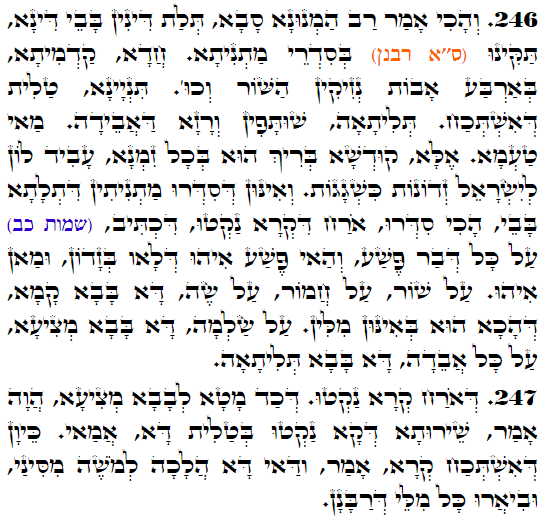Daily Zohar # 3399 – Balak – Three gates of justice
Hebrew translation:
247. שֶׁדֶּרֶךְ הַכָּתוּב לָקַח. שֶׁכְּשֶׁמַּגִּיעַ לְבָבָא מְצִיעָא, הָיָה אוֹמֵר: רֵאשִׁית שֶׁלָּקְחוּ בְטַלִּית זוֹ לָמָּה? כֵּיוָן שֶׁנִּמְצָא פָסוּק, אָמַר: וַדַּאי זוֹ הֲלָכָה לְמֹשֶׁה מִסִּינַי, וּבֵאֲרוּ כָּל דִּבְרֵי חֲכָמִים.
.
Zohar Balak
#246
Rav Hamnuna Sava said that the sages established three gates of justice in the Mishna.
The first gate, Bava Kamma – Four primary causes of injury
The second gate, Bava Metzia – Two people are grasping a garment
The third gate, Bava Batra – Partners and the secret of a lost object.
The reason for this order is that the Holy One Blessed be He treats the sins of the children of Israel as errors.
The editors of the Mishnah followed the Torah verse in Exodus 22:8
“עַל כָּל דְּבַר פֶּשַׁע עַל שׁוֹר עַל חֲמוֹר עַל שֶׂה עַל שַׂלְמָה עַל כָּל אֲבֵדָה אֲשֶׁר יֹאמַר כִּי הוּא זֶה עַד הָאֱלֹהִים יָבֹא דְּבַר שְׁנֵיהֶם אֲשֶׁר יַרְשִׁיעֻן אֱלֹהִים יְשַׁלֵּם שְׁנַיִם לְרֵעֵהוּ.”
“For any kind of trespass, whether it concerns an ox, a donkey, a sheep, or clothing, or for any kind of lost thing which another claims to be his, the cause of both parties shall come before the judges; and whomever the judges condemn shall pay double to his neighbor.”
‘For any kind of trespass’ is unintentional sin, error, ‘whether it concerns an ox, a donkey, a sheep’. This is Bava Kamma, the first gate.
‘or clothing’ is Bava Metzia, and ‘any kind of lost thing’ is the third gate, Bava Batra.
#247
The sages followed the order of the Torah verse above. When Rav Hamnuna Sava reached Bava Metzia that starts with the discussion about ‘two are holding a garment’, he said, it is certain that this order is according to the way Moses arranged it on Mount Sinai, as the sages explain.
Lesson;
The following is a simple and good description that I copied from Wikipedia. I just want to point out that the Mishnah is arranged in 6 parts and with 63 tractates. It is like a ladder from Malchut to the six sefirot of Zeir Anpin and connects us to Binah (63) with the name יוד-הי-ואו-הי.
Rabbi Shimon appears many times in the Mishnah, discussing different Torah laws.
-=-
The Mishnah teaches the oral traditions by example, presenting actual cases being brought to judgment, usually along with (i) the debate on the matter, and (ii) the judgment that was given by a notable rabbi based on halakha, mitzvot, and spirit of the teaching (“Torah”) that guided his decision.
In this way, the Mishnah brings to everyday reality the practice of the mitzvot as presented in the Torah, and aims to cover all aspects of human living, serve as an example for future judgments, and, most important, demonstrate the pragmatic exercise of the Biblical laws, which was much needed since the time when the Second Temple was destroyed (70 CE). The Mishnah is thus not the development of new laws, but rather the collection of existing traditions.
The term “Mishnah” is related to the verb “shanah”, to teach or repeat, and to the adjectives “sheni” and “mishneh”, meaning “second”. It is thus named for being both the one written authority (codex) secondary (only) to the Tanakh as a basis for the passing of judgment, a source and a tool for creating laws, and the first of many books to complement the Tanakh in certain aspects.
The six orders are:
Zeraim (“Seeds”), dealing with prayer and blessings, tithes and agricultural laws (11 tractates)
Moed (“Festival”), pertaining to the laws of the Sabbath and the Festivals (12 tractates)
Nashim (“Women”), concerning marriage and divorce, some forms of oaths and the laws of the Nazirite (7 tractates)
Nezikin (“Damages”), dealing with civil and criminal law, the functioning of the courts and oaths (10 tractates)
Kodashim (“Holy things”), regarding sacrificial rites, the Temple, and the dietary laws (11 tractates) and
Tohorot (“Purities”), pertaining to the laws of purity and impurity, including the impurity of the dead, the laws of food purity and bodily purity (12 tractates).
{||}

 Previous: Balak
Previous: Balak


